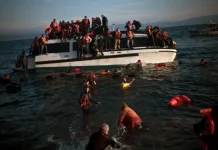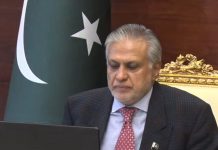BERLIN: Germany declined to be drawn on Friday on whether talks were underway on swapping a Russian state hitman serving a life sentence in a German prison for detained US journalist Evan Gershkovich, an idea floated by Russian President Vladimir Putin.
A German government spokesperson twice declined to answer questions on the proposals, which have repeatedly surfaced in media since Wall Street Journal reporter Gershkovich was first detained last March.
“I can’t say anything on that,” deputy government spokeswoman Christiane Hoffmann said when asked if Russia was seeking such an exchange. “I don’t want to address this concrete case, please,” she added when asked if Germany was in touch with the United States on the matter.
People in the entourage of Chancellor Olaf Scholz, who is visiting Washington for talks with President Joe Biden, also declined to comment. Gershkovich is in detention in Russia on what his newspaper and the US government say are cooked-up charges of spying. The man Putin wants to be released, Vadim Krasikov, is serving a life sentence for the 2019 murder in a Berlin park of an ethnic Chechen from Georgia who had abandoned the armed struggle against Moscow for Chechen independence.
While Putin did not name Krasikov, his reference to an individual “who due to patriotic sentiments eliminated a bandit in one of the European capitals” corresponded closely to the known details of the Berlin murder.
An exchange would be legally possible but very sensitive, not just because it would require Germany to surrender its convict to secure the release of another country’s citizen, but also because of the gravity of Krasikov’s crime.
“We are talking about a case where not only was a murder carried out but the crime was also adjudged to have been of special gravity,” said judge and legal scholar Kai Cornelius of Hamburg University.
“That’s the most serious verdict that can be handed down under German law.”
Krasikov could be released if prosecutors said they no longer wished to see his sentence enforced. –Agencies



